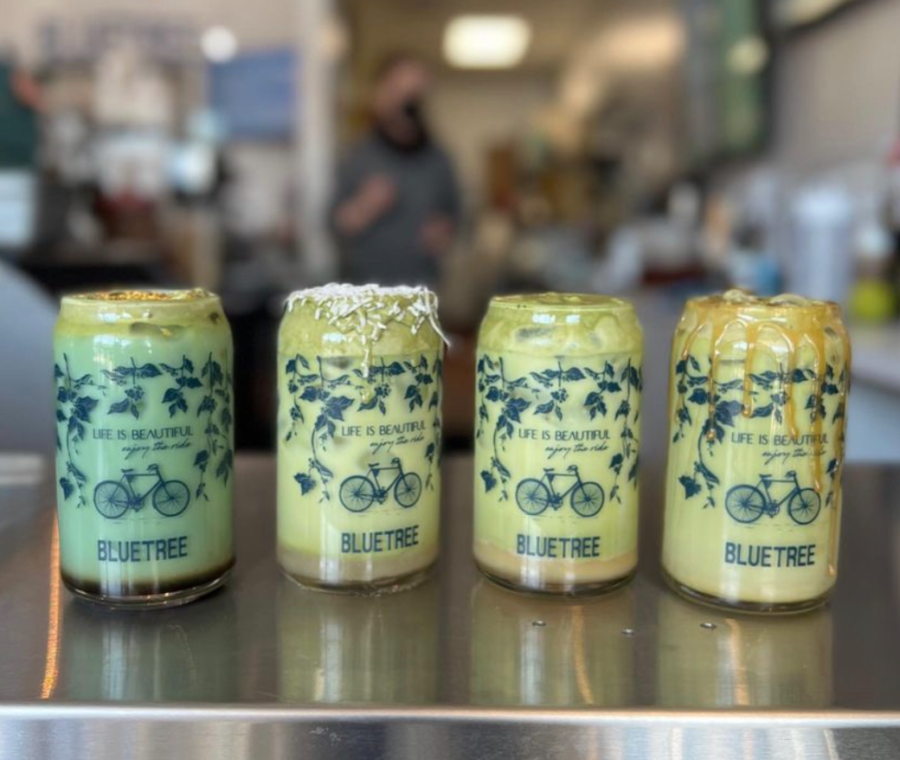The Benefits of Matcha
Matcha had multiple health benefits. Bluetree cafe has four new matcha flavors: Pear Matcha, Coconut Matcha, Eye of the Tiger, and Mystic Matcha.
April 5, 2022
When you go into a coffee shop, there is a high chance that you will see a matcha latte on the menu. If you do not know what matcha is, “it’s a Japanese green tea powder made from finely powdered dried tea leaves,” and it’s a little bitter and has a bright green color due to the leaves’ high chlorophyll levels (loveandlemons.com). Over the past few years, there has been an extreme rise in popularity for matcha, and matcha is supposedly supposed to be very healthy for you!
According to Healthline, there are six health benefits from matcha, which were reviewed by Atli Arnarson, Ph.D. Matcha is high in antioxidants, can help protect the liver, can boost brain function, may help prevent cancer, may promote heart health, and may help promote weight loss (healthline.com).
In matcha, there is a “a large content of polyphenols, amino acids (mainly tannins) and caffeine potentially increase the antioxidant properties of the drink,” and after an experiment testing different factors that may affect matcha, many researchers found that matcha has a “rich content of biologically active substances with antioxidant properties” (ncbi.nlm.nih.gov). Thus, by drinking matcha, it could help your immune system through the high levels of antioxidants in the drink.
Green tea has many properties that lower the risk of liver disease, and a study illustrated that people who drink green tea have a lower risk of liver cancer (webmd.com). Thus, since matcha contains green tea, matcha can help with liver health.
Matcha also can help the brain since it contains natural nootropics. Nootropics are known for helping the brain, and natural nootropics “improve brai health in a safer way.” They are known for enhancing memory and improving “synaptic transmission and neuroplasticity” (ikedamatcha.com). So, by having matcha, you can improve your brain health, productivity, and performance.
As previously stated, matcha can help prevent liver cancer, but it can also help prevent other types of cancer. For instance, matcha can help stop the spread of breast cancer cells. The researchers found that matcha “shifted cancer cells towards a quiescent metabolic state” and stopped their spread at low concentrations (drugtargetreview.com).
Also, matcha can help with your heart. Matcha has some nutrients that help against heart disease. It has reduced levels of LDL cholesterol and triglycerides, and it could prevent the oxidation of LDL cholesterol. In addition, studies show that through drinking green tea, people have less of a risk of heart attacks and strokes (healthline.com).
Lastly, matcha could help promote weight loss. One study found that drinking matcha before a workout or a walk enhanced fat oxidation, which promotes weight loss. Also, in a double-blind trial, green tea was given to one group of overweight people and a placebo was given to another group. In the green tea group, they experience greater weight loss while doing the same activities and eating the same foods. In addition, matcha contains epigallocatechin gallate (EGCG), which is “a plant-based polyphenol with powerful antioxidant properties.” EGCG increases metabolism and stimulates the genes responsible for the breakdown of fat (thehealthychef.com).
Overall, there is a multitude of health benefits for matcha, but in addition to the health benefits, matcha also tastes very good. Hannah Bucklin (12) believes that “matcha is versatile,” and can be used in multiple different types of drinks. She adds that it also has “a creamy texture without the use of dairy or alternative milk.”
Around Yorba Linda, there are multiple places you can get matcha. Obviously, Starbucks and other chain coffee restaurants sell matcha drinks, but they aren’t authentic and may not have all the health benefits. Places like Bluetree Cafe and Bodhi Leaf have ceremonial matcha with all those health benefits, so the next time you are at a place with ceremonial matcha, maybe consider trying it for a variety of health benefits.





































